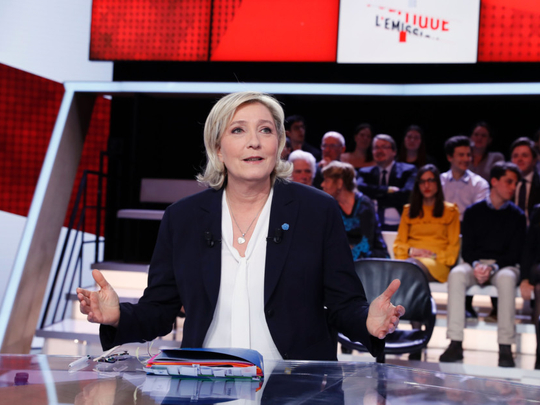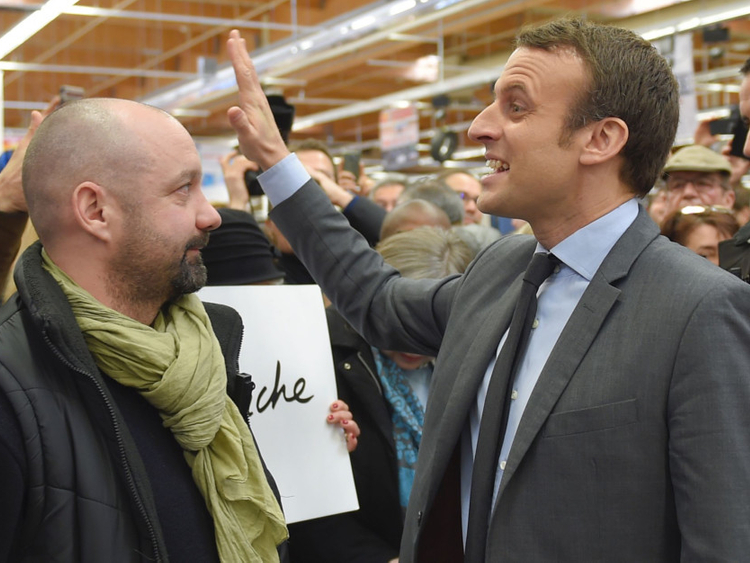
The final round of the French presidential election is just three months away, but the race is already dirtier than the one in the United States last year. All three front-runners — independent centre-left politician Emmanuel Macron, centre-right candidate Francois Fillon and nationalist-populist Marine Le Pen — have faced accusations of financial wrongdoing.
French voters are cynical about their politicians. Last summer, a survey by Harris Interactive for the French office of Transparency International found that 54 per cent of the French believed their country’s elite to be corrupt, for the most part. That share goes up to about three quarters for local and European legislators, the president and the national government. Scandals are part of daily life and they won’t necessarily affect the outcome of the election, but the circus is in full swing, anyway.
Last week, Fillon announced grimly that he’d stay in the race despite revelations that he’d paid his family members about $1 million (Dh3.67 million) out of his parliamentary budget for services opponents claim were never rendered. Juicy details just kept coming: He’d paid his wife Penelope a severance fee after laying her off as his aide; he’d employed his sons for legal services though they hadn’t been qualified lawyers; he’d paid them all more than the going rates for parliamentary aides. All this from someone who took the high moral ground as he fought for the centre-right nomination, using their own financial scandals against rivals Nicolas Sarkozy and Alain Juppe. Fillon said he regretted the actions, but explained it had all been legal (indeed, France has lax rules on nepotism) and accepted custom at the time; though 65 per cent of French voters were unconvinced.
Fillon, scarred and pushed back in the polls by “Penelopegate”, is now being extra careful about observing campaign finance laws. After all, Sarkozy has just been ordered to stand trial for the campaign spending violations in his failed 2012 campaign, and Fillon would rather be outspent than faced with another scandal.
Le Pen faces her own ethical problems. The biggest of these comes from Brussels, where she too, is accused of paying fake parliamentary aides. Le Pen is a member of the European Parliament, and as such, she is given a $25,700 monthly budget for payments to staff. The staff members, however, are meant to work on the European agenda and to live in Brussels, and, according to the conclusions of a European Parliament investigation, Le Pen and other legislators from her National Front party have misused the funds by essentially paying people to work for the party in France. The European Parliament is trying to recover about half a million euros from the parliamentary group that includes Le Pen and her fellow party members — a lot of money for Le Pen, given the National Front’s highly publicised financial difficulties. Le Pen is now suing the European Parliament, claiming that the investigation was inspired by a political foe, former speaker Martin Schulz, a German Social Democrat.
There’s potential trouble for Le Pen in France, too, involving the way the National Front funded its previous campaigns. The party employed the companies of Le Pen’s close friends to print campaign materials and set up websites, allegedly at inflated prices, and then got the government to reimburse the expenses, as it is obliged to do when a party meets a certain threshold of support. The National Front also took out expensive loans from Jeanne, a microparty set up by Le Pen, and had them repaid from government coffers after the campaigns ended. Le Pen hasn’t been charged with any wrongdoing or even interrogated, but there’s still plenty of time for this to blow up before the election — just as there’s time for a potential scandal involving the property declarations of Le Pen and her father, National Front founder Jean-Marie Le Pen. They are being investigated for allegedly undervaluing their properties listed in the declarations.
Even political novice Macron, whose experience in government is limited to a short stint as economic minister, is under a cloud. In a recently published book, he was accused of using ministry funds to start his presidential campaign. Both he and government officials have vehemently denied the charge and it has not led to an investigation, but it’s still out there for Macron’s enemies to use.
The attacks have also been personal. He is married to his high school French teacher, 24 years older than he is. A sensationalist publication known for revealing President Francois Hollande’s affair with actress Julie Gayet, published a suggestive piece about Macron that it later removed from its website.
Macron has sought to deflect the rumours with a joke, telling an audience in Paris that his wife Brigitte wonders how he could lead a double life if he’s with her all the time. So far, the polls still have him beating Le Pen in a run-off.
So far, Fillon has suffered the most from the dirt eruption, probably because of the virtuous image he had tried to cultivate before the payments to his family came to light. Eurosceptic Le Pen may end up benefiting from her spat with the European Parliament — her usual defence, that corrupt, cosmopolitan elites are against her, has worked well with that electorate so far. As Americans saw with Republican candidate and eventual President Donald Trump, attempts to accuse a nationalist candidate of corruption can backfire. Le Pen is immunising herself by playing Joan of Arc in slick videos like the one released last week.
It’s likely that the candidates will be showered with more mud in the remaining time before the vote, and DSGE, the French intelligence service, expects Russia to support Le Pen’s candidacy with attempts to compromise her rivals using social networks. French voters will yet need to draw on their reserves of cynicism, and outside observers need a big bowl of popcorn.
— Bloomberg
Leonid Bershidsky is a Bloomberg View columnist.










